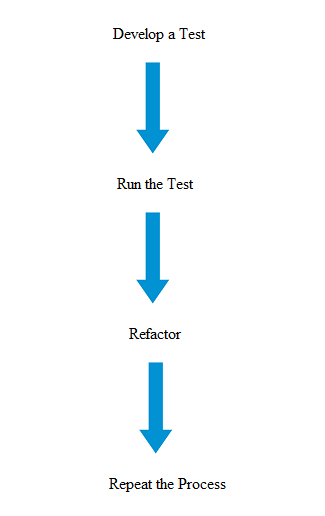Test-driven development (TDD) is an agile development methodology that is very popular in today’s software industry. TDD is easy to apply in Node.js and it speeds up the development cycle apart from producing better code.
TDD is sometimes referred to as Test First Development (TFD) because you develop and run test before developing the actual code for a new product or functionality.
The genius of TDD lies in ensuring that all parts of your applications are covered by tests. Another advantage of writing your tests is that you can avoid the cognitive load of remembering all the functionalities or implementation details. Most people tend to forget the nitty-gritty details about a code that they have developed when it comes to testing at a later stage.
TDD also results in improved bug detection and greater programmer confidence.
While the TDD methodology is practical and popular, JavaScript community is just beginning to adopt this approach. This is because JavaScript APIs, both in the browser and Node.js, tend to be event-driven, making it difficult to test. You need practice and a different mindset to make this challenge manageable. The logic of synchronous testing is different from asynchronous testing.
The good news is that TDD can help detect the complex issues that arise in an event-based paradigm. In addition, you can optimize the TDD methodology using automated tests. JavaScript testing frameworks such as Mocha, Chai, Nock, Sinon and Lab are designed to make asynchronous testing of your Node.js project manageable.
TDD to Ensure Node.js API Code Quality
With Node.js increasingly becoming a language of choice for Representational state transfer (REST) API development, let us examine how TDD can help ensure quality code. Node.js allows you to build a RESTful web page capable of serving both HTML content and an API, along with many more features. However, it is crucial to have your API code tested before you release it to your users.
In TDD, as mentioned earlier, tests are written first. This will help you think of an ideal API independently from implementation details, leading to the creation of much cleaner APIs. Besides, architectural flaws become apparent in TDD approach.
In web development, we open the browser and interact with our application to see how our code behaves. With Node.js you can verify the code independent of the browser setting and if you follow TDD approach using automated testing tools, you can further optimize this process.
Historically, developers have been relying on manual testing to check the web applications as they are difficult to auto-test. TDD comes in handy for testing web apps as standalone services and REST API can be tested thoroughly under this approach.
TDD – The Process
TDD involves first defining a test that expects the output you want from API, or whatever functionality, you are testing to produce. The test invariable fails as you have not yet implemented any functionality. After the failure, you change the code or do refactoring. The same process is repeated whenever you need to add a new functionality. The point to remember is that the focus in TDD is on production code. You just write enough production code to pass the test or write the implementation code that would pass the test.
The objective is to improve your existing design over time by making very small, simple changes. The important point to note here is that you are improving your existing code and not adding a new functionality. You can add a new functionality after refactoring the existing production code. This process helps you to think through your design and improve it before your write your functional code. You can also avoid code duplication in this manner.

Advantages of TDD
The objective of TDD is specification and not validation. The test will determine whether the system meets the business requirements or functionalities defined for it.
It makes you think whether the existing design is the best design possible to support the new functionalities. If the test fails, you go back and improve the existing design before adding new functionalities. You refactor only a small portion of the design that is affected by the new feature. This enables you to add new functionalities in the simplest and the easiest way possible,
This process enhances the efficiency and ensures that the code is clearer and bug-free.
You have to remember that even the most carefully constructed applications will grow in complexities over time, making it difficult to maintain quality. If you add a new functional code to such a complex design, it becomes difficult to pin-point the exact breaking change to the code base.
In TDD every single line of code is tested. This leads to efficient project management. Whenever a new person makes a breaking change to the code base your test will indicate it by failing. In fact, you write tests for the future. Your tests will make the design simpler so that it becomes easier to make changes later.
TDD allows you to make keep a flexible design. As you know on an agile development project, applications are added in an incremental manner.
If you are designing a web app for a client using Node.js, it is quite possible that their needs will evolve over time and you will be required to accommodate those new specifications. Besides, a rapidly changing business environment will also force you to add new features. The traditional development model does not support such an approach because making changes to a large codebase and making sure it works is going to create problems. This is when the TDD methodology becomes your greatest advantage. With TDD, you can write concise, easily maintainable codes even before thinking about writing implementation code.
A traditional software development model is not suitable for today’s business environment. TDD is a powerful methodology to follow for developing applications in Node.js It helps project teams to avoid many common project pitfalls. If you are looking for a partner who reorganizes and re-envisions the activities involved in software development, Gemini can help you. To know more contact us.



